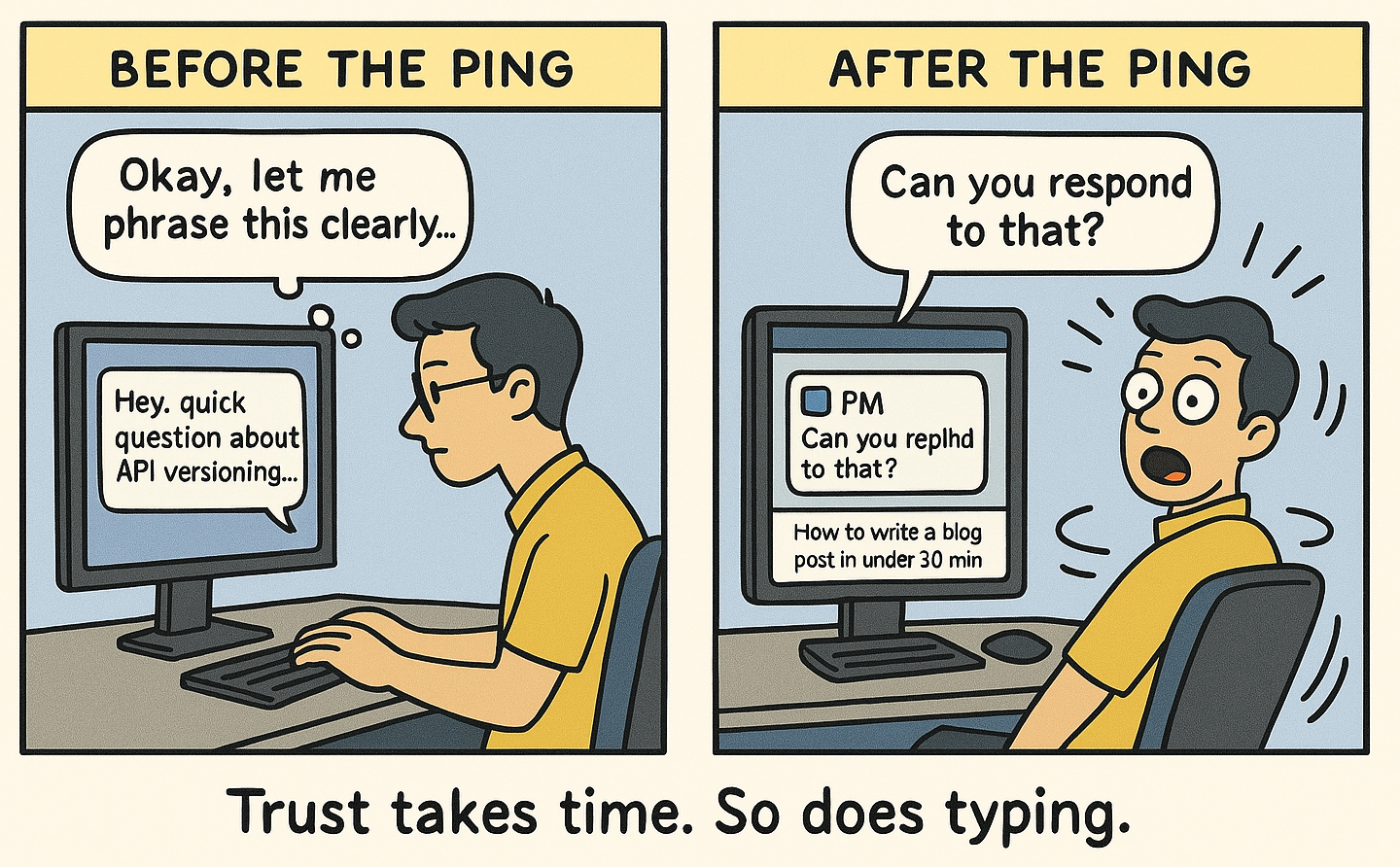Beyond the Ping
Elevating Project Management to Boost Team Morale and Productivity
The Vital Role of Project Managers
Project Managers (PMs) are the backbone of successful projects—coordinating timelines, mitigating risks, and ensuring alignment across teams. Their role is pivotal. When done well, PMs empower teams to thrive. However, common pitfalls—such as excessive "pinging"—can inadvertently undermine their impact. This post explores how PMs can move beyond superficial check-ins to foster trust, efficiency, and collaboration.
The Ping Trap: Recognizing Counterproductive Habits
The "Ping Trap" occurs when PMs default to constant nudges—messages, calls, or reminders—without adding strategic value. Common scenarios include:
- Premature follow-ups: Interrupting a developer mid-task to ask, "Is it done yet?" moments after assigning work.
- Undermining problem-solving: Pinging a team member already drafting a response, creating friction.
- Micromanagement: Prioritizing updates over trust, leading to a culture of anxiety rather than accountability.
- Jumping the gun: A developer sees a teammate’s question in Slack and starts typing a thoughtful response—only to get pinged moments later by the PM asking them to "please respond." This not only breaks focus and signals impatience rather than trust—it may also divert the developer into writing a long blog post (like this one) about how annoying and nerve-wracking that behavior is.

This behavior often stems from pressure to deliver results—but it risks alienating the very teams PMs aim to support.
The Hidden Costs: Morale, Productivity, and Trust
- Eroded morale: Constant interruptions signal distrust, making teams feel surveilled rather than supported.
- Fragmented productivity: Context-switching caused by pings can drain focus, delaying progress on complex tasks.
- Stifled ownership: Teams may disengage, relying on PMs to drive every decision instead of taking initiative.
Constructive Alternatives: How PMs Can Add Real Value
- Set clear expectations: Agree on timelines and check-in rhythms upfront. Example: “Let’s sync every Thursday at 1600Z for updates, unless urgent.”
- Trust, then verify: Allow space for autonomy. Use tools like GitHub Issues or Asana to minimize live pings.
- Facilitate—don’t micromanage: Clear obstacles by connecting teams to resources rather than dictating solutions. One memorable question from a PM I liked a lot was: “What am I not doing for you?”
- Proactive communication: Share context (e.g., shifting stakeholder needs) to reduce reactive inquiries.
- Reflect before pinging: Ask, “Is this urgent? Could it wait until the next check-in? Am I adding clarity or value?”
Agile Insight: The Agile Manifesto emphasizes “individuals and interactions over processes and tools.” Trusting teams to self-organize aligns with this principle. Keep it in mind.
A Call to Action: Fostering Collaborative Success
Great PMs don’t just track progress—they amplify it. By shifting from "checker" to "coach," PMs can:
- Build psychological safety, encouraging teams to voice challenges early.
- Celebrate milestones, reinforcing positive momentum.
- Invest in relationships by understanding each member’s workflow and strengths.
For teams: Open dialogue is key. Consider framing feedback as: "I’m more productive with focused blocks of time. Can we align updates at [specific interval]?"
Conclusion: Elevating the PM Role Together
Project success hinges on collaboration—not constant annoying check-ins. By embracing trust, strategic communication, and empathy, PMs can transform from perceived naggers to invaluable leaders. Let’s champion practices that uplift teams—because when PMs and developers partner effectively, everyone wins.
